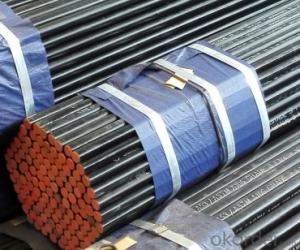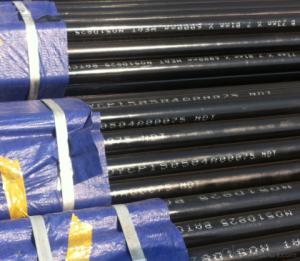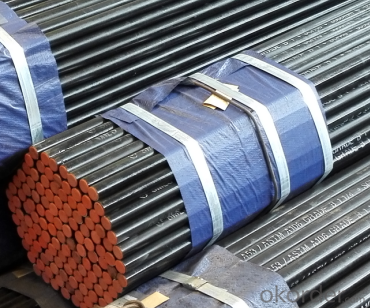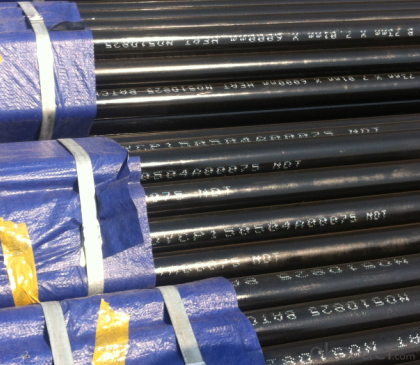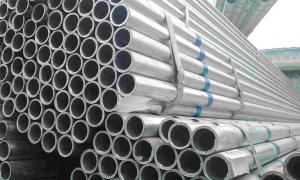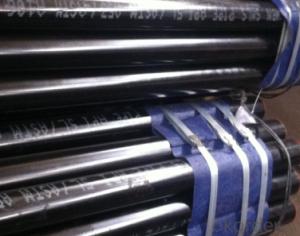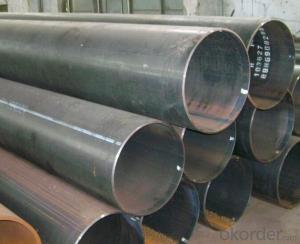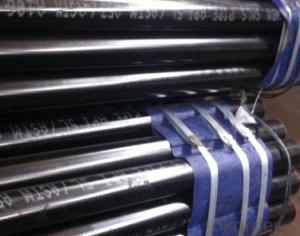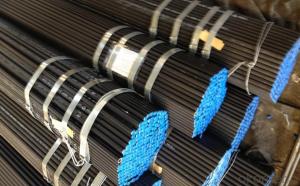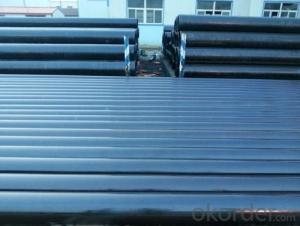Carbon Smls Steel Pipe Api 5l/ Astm /A106 A53/ Grade B
- Loading Port:
- Tianjin
- Payment Terms:
- TT OR LC
- Min Order Qty:
- 50 m.t.
- Supply Capability:
- 2000 m.t./month
OKorder Service Pledge
OKorder Financial Service
You Might Also Like
1、Structure of Carbon Smls Steel Pipe Api 5l/ Astm /A106 A53/ Grade B:
Seamless pipe is formed by drawing a solid billet over a piercing rod to create the hollow shell. As the manufacturing process does not include any welding, seamless pipes are perceived to be stronger and more reliable. Historically seamless pipe was regarded as withstanding pressure better than other types, and was often more easily available than welded pipe.
2、Main Features of Carbon Smls Steel Pipe Api 5l/ Astm /A106 A53/ Grade B:
• High manufacturing accuracy
• High strength
• Small inertia resistance
• Strong heat dissipation ability
• Good visual effect
• Reasonable price
3、Carbon Smls Steel Pipe Api 5l/ Astm /A106 A53/ Grade B Specification:
Standard | GB, DIN, ASTM ASTM A106-2006, ASTM A53-2007 |
Grade | 10#-45#, 16Mn 10#, 20#, 45#, 16Mn |
Thickness | 8 - 33 mm |
Section Shape | Round |
Outer Diameter | 133 - 219 mm |
Place of Origin | Shandong, China (Mainland) |
Secondary Or Not | Non-secondary |
Application | Hydraulic Pipe |
Technique | Cold Drawn |
Certification | API |
Surface Treatment | factory state or painted black |
Special Pipe | API Pipe |
Alloy Or Not | Non-alloy |
Length | 5-12M |
Outer Diameter | 21.3-610mm |
Grade | 20#, 45#, Q345, API J55, API K55, API L80, API N80, API P110, A53B |
Standard | ASME, ASTM |
1) Material:20#(ASTM A 106/A53 GRB.API5LGRB,GB),45#,16Mn,10#.
2) Specification range:OD:21.3-610mm,WT:6-70mm,length:6-12m or according to the requirement of clients.
3) Excutive standards:GB,ASME API5L.ASTM A 106/A53,Despite of the above standards,we can also supply seamless steel pipe with standard of DIN,JIS,and so on,and also develop new products according to the requirements of our clients!
4) Surface:black lacquered,varnish coating or galvanized.
5) Ends:Beveled or square cut,plastic capped,painted.
6) Packing:bundles wrapped with strong steel strip,seaworthy packing.
4、Packaging & Delivery of Carbon Smls Steel Pipe Api 5l/ Astm /A106 A53/ Grade B:
Packaging Details: | seaworthy package,bundles wrapped with strong steel strip |
Delivery Detail: | 15-30days after received 30%TT |
5、FAQ of Carbon Smls Steel Pipe Api 5l/ Astm /A106 A53/ Grade B:
①How is the quality of your products?
Our products are manufactured strictly according to national and internaional standard, and we take a test
on every pipe before delivered out. If you want see our quality certifications and all kinds of testing report, please just ask us for it.
Guaranteed: If products’ quality don’t accord to discription as we give or the promise before you place order, we promise 100% refund.
②How about price?
Yes, we are factory and be able to give you lowest price below market one, and we have a policy that “ for saving time and absolutely honest business attitude, we quote as lowest as possible for any customer, and discount can be given according to quantity”,if you like bargain and factory price is not low enough as you think, just don’t waste your time.Please trust the quotation we would give you, it is professional one.
③Why should you chose us?
Chose happens because of quality, then price, We can give you both.Additionally, we can also offer professional products inquiry, products knowledge train(for agents), smooth goods delivery, exellent customer solution proposals.Our service formula: good quality+good price+good service=customer’s trust
SGS test is available, customer inspection before shipping is welcome, third party inspection is no problem.
6、Carbon Smls Steel Pipe Api 5l/ Astm /A106 A53/ Grade B Images:
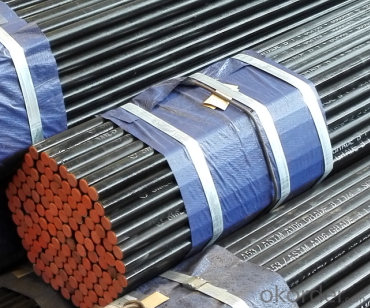
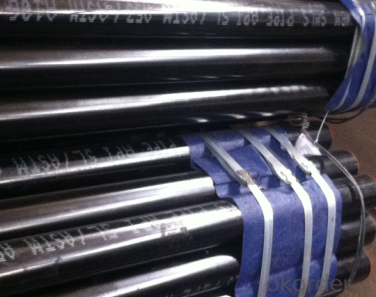
- Q: How can the immersed pipe pile put steel cage into the steel pipe? Which expert to answer?
- Pile: refers to the use of hammer piling method and pile vibration method, steel casing with valve type pile tip or precast reinforced concrete pile boots into the soil, then pouring concrete (or first in the tube into the cage), while hammering or vibration of a pile side pull tube. The former is called hammer sinking pipe cast-in-place pile, and the latter is called vibrating sinking pipe cast-in-place pile.
- Q: Can steel pipes be used in earthquake-prone areas?
- Yes, steel pipes can be used in earthquake-prone areas. Steel has high tensile strength and can withstand seismic forces better than other materials. Additionally, steel pipes can be designed to be flexible and resistant to bending and cracking during earthquakes, making them a suitable choice for infrastructure in such areas.
- Q: Will the steel tube dance?
- In a single pole dance performance, the dancer moves more naturally, herself, moves and techniques, and does what she wants to do, while the style of dance is determined by herself, no one intervenes, and quite free.
- Q: What steel pipes are buried for outdoor heating pipes? Seamless or welded tube? Are there any rules for specific countries? Can use the seamed tube?
- Where outdoor heating pipes are buried, what steel pipe shall be referenced by the 11.1.2 code for installation of outdoor piping?:This chapter applies to the quality inspection and acceptance of the outdoor heating pipe network installation of the plant and the civil building group (residential area) with the saturation steam pressure not greater than 0.7MPa, and the hot water temperature not exceeding 130 degrees celsius.
- Q: Are steel pipes suitable for use in acidic environments?
- Yes, steel pipes are generally suitable for use in acidic environments. However, the specific grade of steel and the concentration of the acid should be considered to ensure proper corrosion resistance. Coating or lining the pipes with materials such as epoxy or rubber can also enhance their resistance to acidic conditions.
- Q: Can steel pipes be used for industrial ventilation systems?
- Yes, steel pipes can be used for industrial ventilation systems. Steel pipes are commonly used in such systems due to their durability, resistance to high temperatures, and ability to handle high airflow volumes. They are also cost-effective and can be easily fabricated to meet specific requirements of an industrial ventilation system.
- Q: What are the different grades of steel used in manufacturing pipes?
- There are several grades of steel used in manufacturing pipes, including carbon steel, alloy steel, stainless steel, and duplex steel. Each grade has distinct properties and characteristics that make it suitable for different applications and environments.
- Q: What are the different types of steel pipe elbows?
- There are various industries and applications that commonly utilize different types of steel pipe elbows. These types encompass: 1. 90-degree elbows: Employed when redirecting fluid or gas flow requires a sharp 90-degree bend. They find extensive use in plumbing, construction, and industrial piping systems. 2. 45-degree elbows: Similar to 90-degree elbows, these elbows alter flow direction, but with a smaller angle. They are suitable for situations requiring a more gradual change in flow direction. 3. Long radius elbows: Differing from standard elbows, long radius elbows possess a larger curvature radius. This design minimizes fluid friction and pressure drop, making them ideal for applications necessitating smoother flow, such as high-flow systems or those involving viscous fluids. 4. Short radius elbows: In contrast, short radius elbows feature a smaller curvature radius. They are generally utilized in confined spaces where a compact design is essential, although they may lead to increased fluid friction and higher pressure drops. 5. Reducing elbows: These elbows are ideal for connecting pipes of varying diameters. With one end having a larger diameter and the other end with a smaller diameter, they enable a seamless transition between two pipes of different sizes. 6. Mitered elbows: Mitered elbows are tailor-made elbows fabricated by cutting and welding multiple pipe sections at specific angles. They are frequently employed when standard elbows cannot accommodate the required angle or when a unique design is necessary. In conclusion, the selection of the appropriate type of steel pipe elbow depends on factors such as the specific application, fluid flow requirements, space limitations, and compatibility with the piping system.
- Q: What are the advantages of using steel pipes in marine applications?
- Using steel pipes in marine applications offers several benefits. Firstly, steel pipes possess exceptional durability and a high resistance to corrosion. This is crucial in marine settings where pipes are constantly exposed to saltwater, which can rapidly degrade materials. Steel pipes can withstand these harsh conditions and maintain their structural integrity for extended periods. Another advantage of utilizing steel pipes in marine applications is their strength. Steel is a robust and sturdy material that can endure high pressure and extreme conditions commonly encountered in marine operations. This makes steel pipes ideal for transporting fluids, such as water, oil, and gas, in marine environments. Moreover, steel pipes provide excellent fire resistance. In the event of a fire on a ship or offshore platform, steel pipes act as a reliable fire barrier, preventing the spread of flames and ensuring the safety of personnel and equipment. Furthermore, steel pipes are highly versatile and can be easily fabricated to meet specific requirements. They can be manufactured in various sizes, shapes, and thicknesses, allowing for customization to suit the particular needs of marine applications. Steel pipes can also be easily welded together, creating a seamless and leak-proof system. Lastly, steel pipes prove to be cost-effective in the long run. Although the initial investment may be higher compared to other materials, the durability and longevity of steel pipes make them a cost-efficient choice. With minimal maintenance and a long lifespan, steel pipes reduce the need for frequent replacements, resulting in significant cost savings over time. In conclusion, the advantages of using steel pipes in marine applications include their durability, corrosion resistance, strength, fire resistance, versatility, and cost-effectiveness. These factors make steel pipes a reliable and efficient choice for various marine operations, ensuring the safe and efficient transport of fluids in harsh marine environments.
- Q: How are steel pipes protected against rust?
- Steel pipes can be safeguarded against rust in various ways. One popular approach entails applying a protective coating to the pipes. This can be achieved through the use of a paint layer, epoxy, or a corrosion-resistant coating like zinc or galvanized coatings. These coatings act as a barrier between the steel and moisture, preventing rust formation. Another technique for shielding steel pipes from rust involves cathodic protection. This method employs sacrificial anodes, typically composed of zinc or magnesium, which are affixed to the steel pipes. These anodes corrode instead of the steel, sacrificing themselves and preventing rust on the pipes. In addition to coatings and cathodic protection, corrosion inhibitors can also be employed to protect steel pipes against rust. Corrosion inhibitors are chemicals that are added to the water or fluid flowing through the pipes. These chemicals generate a protective film on the steel's surface, inhibiting corrosion and preventing rust formation. Furthermore, regular maintenance and inspections play a vital role in safeguarding steel pipes against rust. Promptly addressing any signs of damage or wear on the protective coatings is crucial to prevent rust formation. Additionally, ensuring that the pipes are properly cleaned and dried before applying protective coatings can enhance their effectiveness. In summary, a combination of protective coatings, cathodic protection, corrosion inhibitors, and regular maintenance is utilized to effectively shield steel pipes against rust and corrosion. This approach prolongs their lifespan and maintains their structural integrity.
Send your message to us
Carbon Smls Steel Pipe Api 5l/ Astm /A106 A53/ Grade B
- Loading Port:
- Tianjin
- Payment Terms:
- TT OR LC
- Min Order Qty:
- 50 m.t.
- Supply Capability:
- 2000 m.t./month
OKorder Service Pledge
OKorder Financial Service
Similar products
Hot products
Hot Searches
Related keywords
